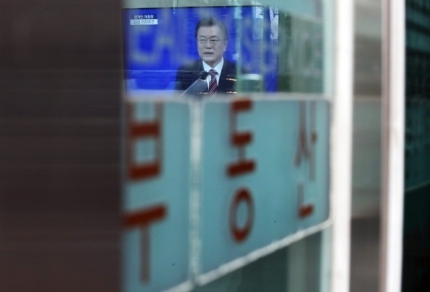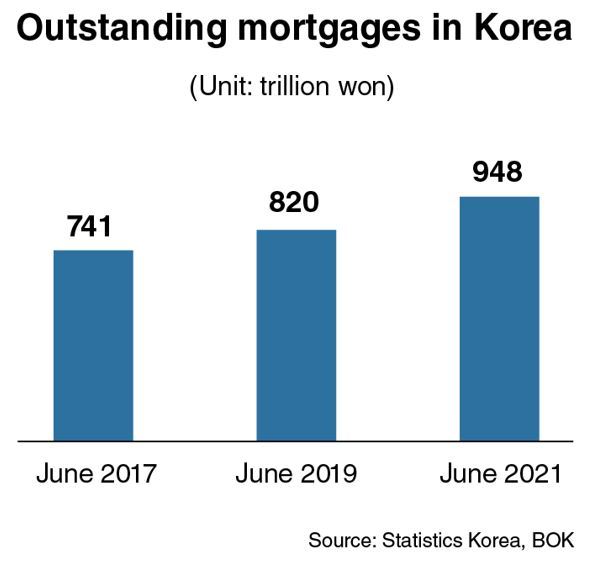 |
President Moon Jae-in is seen on TV at a real estate agency in Seoul on Jan. 18, when he unveiled yearly policy directions in a press conference. (Yonhap) |
SEJONG -- There is a possibility that the outstanding mortgages in the nation will surpass 1,000 trillion won ($856 billion) for the first time as early as in the first half of next year, given the current growth pace.
The outstanding mortgage loans -- issued to households for home purchase by financial services firms or state-run agencies -- reached the record-high of 948 trillion won as of June, according to the Bank of Korea and Statistics Korea.
This was a 27 percent, or 207 trillion won, increase under the Moon Jae-in administration, compared to 741 trillion won as of June 2017. The Moon government took office in May 2017.
The pace has accelerated recently as the figure surged by 75 trillion won from June 2020 to June 2021. The growth was 52 trillion won from June 2019-June 2020, and 34 trillion won from June 2018-June 2019.
 |
(Graphic by Kim Sun-young/The Korea Herald) |
Under the assumption that the 2020-2021 pace would maintain, the balance in outstanding mortgage loans would top the 1,000 trillion mark by mid-2022, though it is an arithmetical estimate.
On the other hand, the growth pace will possibly slow down as the financial authority, first-tier commercial banks and the Land Ministry have continued to apply tougher regulations for mortgages to restrict lending to the household sector over the past few months.
But a worrisome point, in this situation, is that people -- being rejected over loans from commercial banks -- could possibly resort to secondary financial services firms, running the risk of quite higher loan rates.
Skyrocketing house prices in Seoul since late 2018 -- from a shortage of supply and a variety of property regulations -- have caused an unprecedented situation where more and more young people in their 20s and early 30s hurried to buy apartments by taking out huge loans. This was based on their sentiment that they might never be able to purchase an apartment if they wait any longer.
In the early stage of his tenure, President Moon had pledged to stabilize the property market, and a large portion of households were estimated to have delayed their plans to purchase homes.
A real estate agent in Sejong said the government should be held accountable for the de facto failure in real estate policy and a 100 percent jump in Seoul apartment prices in about four years.
“Given a large portion of people’s uneasiness about the record-breaking apartment prices, a soft landing should be pushed for by permitting eased mortgage terms for those not owning homes, rather than handing down full-fledged stern measures like suspension or drastic scaling back of mortgages,” he said.
A resident in Sejong said prices of some apartment complexes in Sejong climbed up to 100 percent in only a year between 2019 and 2020.
Saying that her apartment also posted a similar price increase, the resident said she was sorry for younger people. “The irrational prices have caused lack of motivation at workplaces and harmed the value of labor.”
Statistics Korea data showed that mortgages accounted for 55.6 percent of the total outstanding loans at 1,705 trillion won, issued to households by financial services firms, as of June 2021.
When credit-based payment services totaling 100 trillion won are included, the outstanding household debt comes to the all-time high of 1,805 trillion won.
Amid the apartment fever, the collective household debt in South Korea showed a steady increase -- from 1,387 trillion won in June 2017 to 1,492 trillion won in June 2018, 1,557 trillion won in June 2019, 1,637 trillion won in June 2020 and exceeding 1,800 trillion won in June 2021.
By Kim Yon-se (
kys@heraldcorp.com)









